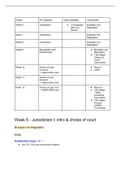Summary
Conflict of Laws Summary + Weekly Questions (week 6-12)
- Course
- Institution
The summary contains the weekly topics which are discussed throughout the course and the weekly guiding questions with the relevant 7 steps and answers. The document provides an overview of how to analyse PIL Questions in the Exam and contains the following topics: 1) Jurisdiction I: intro & choice...
[Show more]



